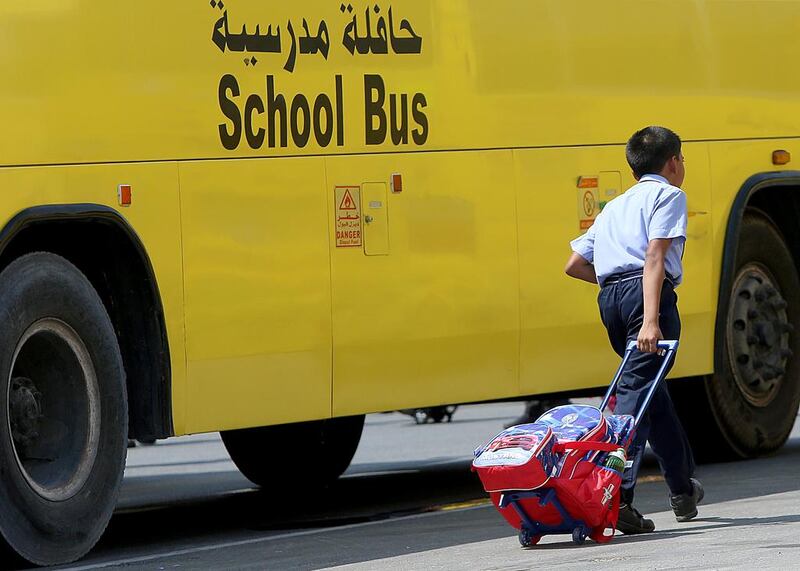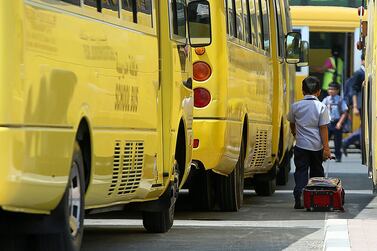Private schools in Dubai will be able to hike fees for the first time in two years following a ruling by the Crown Prince.
School operators will be allowed to increase prices by a maximum of 4.14 per cent in 2019-2020, depending on their performance rating.
Sheikh Hamdan bin Mohammed, Crown Prince of Dubai and Chairman of Dubai Executive Council, approved the School Fees Framework on Monday night.
It follows a freeze on all school fees last year — the same year VAT was introduced.
The authorities use a complex calculation to determine how much schools of varying abilities can charge.
This year's formula benefits failing schools, allowing them to raise fees more than the top performers for the first time if they improve their rating, as assessed by Knowledge and Human Development Authority inspections.
A school rated less than 'good' that raises its rating to 'acceptable' or good would be able to raise fees by the full 4.14 per cent this year. Previously it would have been about half that.
A school rated 'very good' that improves to 'outstanding' can hike fees by 3.1 per cent this year.
A school that maintains its standards will be allowed to raise its fees by 2.07 per cent.
“The new school fees framework will encourage schools to improve their performance and maintain desired quality levels according to annual inspections and the Dubai Statistics Centre’s price index for education. No private school will be allowed to raise fees if its rating slips," Sheikh Hamdan said on Twitter.
Shaikh Rashid Al Maktoum Pakistani School in Dubai was rated 'weak' according to inspections for seven consecutive years from 2011, until it improved its rating to 'acceptable' in 2018.
Jamal Hassan, vice principal at the school – with annual fees that range from Dh3,130 in kindergarten to Dh6,259 in Grade 12 – said they focused their limited resources on teacher training and building the resources available to pupils.
“This is a good move and we will be able to do a lot for the school with the increased funds," said Mr Hassan.
“We will use the additional funds to develop the school's facilities, such as the library and computer laboratories. We hope to use it to move towards a good rating and we want to invest in teacher training."
Taaleem, a school developer that has 10 schools across the country, said the majority of its schools will be freezing fees over the coming academic year.
"We are a group of premium quality schools all rated outstanding to good, we don't have mid- or low-tier prices. For us, it's all about improving quality and sensitive pricing. We have held our fees for two years now and we are acutely aware of the pressures on parents with the regular increases in their cost of living, said Clive Pierrepont, director of communications.
It is admirable that the new fee structure is incentivising ‘weak’ and acceptable schools to improve, he said.
"It remains to be seen whether the increases allowed in these traditionally low-fee schools will have the desired impact. Four per cent of Dh13,000 [in fees] is still a great deal less than 2 per cent of Dh60,000, therefore the challenge of attracting the high quality staff needed to turn these schools around will still remain."
He believes that interschool partnerships should be promoted, with higher-ranking schools incentivised to help weaker schools.
Ron Hodkinson, principal of Ontario International Canadian School, which is rated acceptable, welcomed the move as he said it will bring stability and enhance education.
"The only area I am concerned about is that if a school drops in the rating, they have to ask some hard questions about why that happened. If there professional development is needed for staff, this may require extra funding," he said.
An increase in fees does not motivate his school, he said, rather that they are motivated by the achievement of pupils.
Over the last seven years, 76 new schools have opened in Dubai and more than 80,000 pupils have enrolled.
“Our previous fee framework encouraged investors and school owners to create capacity in the private education sector by balancing the gap between supply and demand. Moving forward, the new framework reflects our commitment to create a more robust and reliable private education sector that emphasises affordability, quality of education and more choices," said Dr Abdulla Al Karam, director general of the KHDA.
Of the 166 private schools inspected in 2017-18, 14 were rated outstanding, 27 very good, 68 good, 51 acceptable and six weak.
Sara, a mother from Dubai with two children aged 12 and eight, said: "Why should schools increase fees if they are not improving their rating?
"If I feel that the school is improving, I can accept this increase in fees." Otherwise, she said, she would move her children to different schools.








